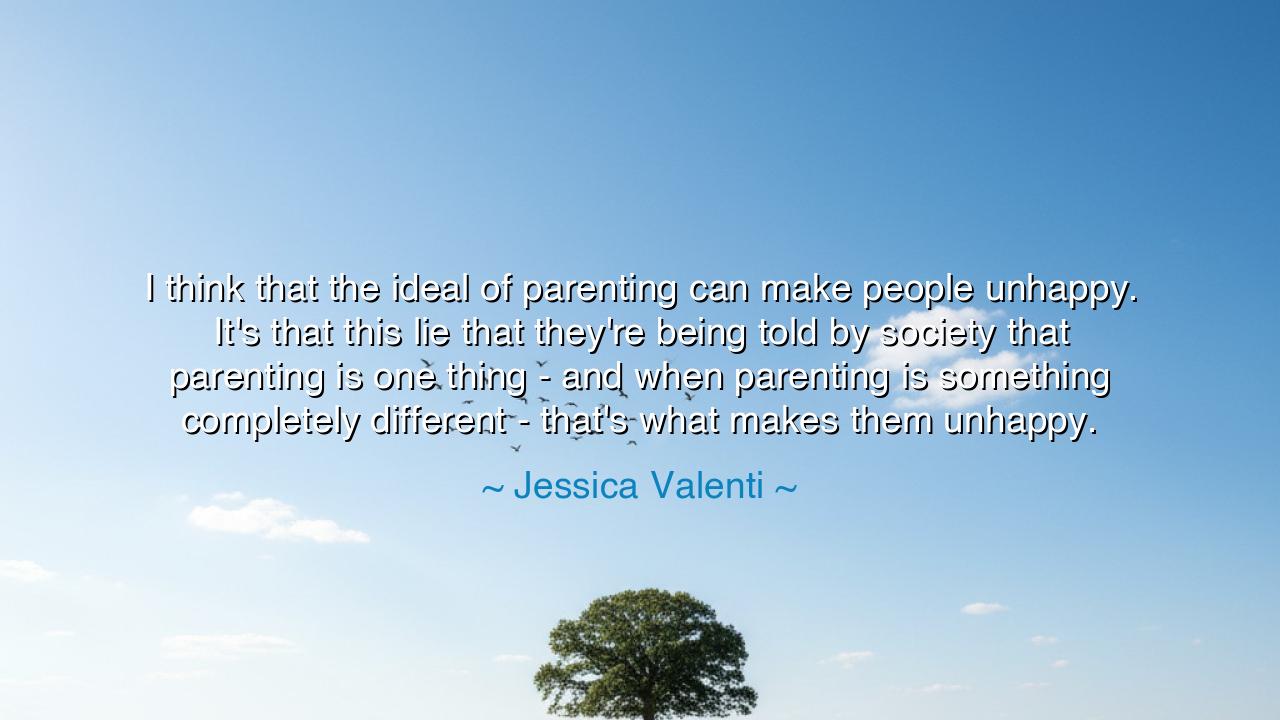
I think that the ideal of parenting can make people unhappy.
I think that the ideal of parenting can make people unhappy. It's that this lie that they're being told by society that parenting is one thing - and when parenting is something completely different - that's what makes them unhappy.






Hear the voice of Jessica Valenti, who speaks with the fire of truth: “I think that the ideal of parenting can make people unhappy. It’s that this lie that they’re being told by society that parenting is one thing – and when parenting is something completely different – that’s what makes them unhappy.” These words pierce the veil of illusion, naming a falsehood that has burdened countless mothers and fathers. Society paints a picture of parenting as serene, joyous, and effortless, a story of endless smiles and gentle moments. Yet the reality is messier, more difficult, more human. And when the dream and the truth collide, disappointment arises—not from failure, but from being misled.
From the dawn of culture, each age has woven myths of the perfect family. The ancients spoke of the noble household, where children honored their parents and parents ruled with wisdom. In later centuries, art and literature often showed mothers as angels and fathers as wise providers, painting family life as an idyll untouched by struggle. Yet beneath these stories, the reality has always been more complex: children resist, parents falter, exhaustion weighs upon the heart. Valenti reminds us that it is the gap between the ideal and the reality that breeds sorrow, for people measure themselves against an image that was never true to begin with.
This struggle is not new. Consider the story of Rousseau, philosopher of the Enlightenment, who wrote passionately about the natural innocence of children and the beauty of raising them according to nature. His book Émile became a guide for generations, extolling the purity of childhood. Yet Rousseau himself abandoned his own children to orphanages, unable or unwilling to live the very ideal he proclaimed. His life reveals the danger Valenti names: when society preaches lofty visions of parenting while hiding the hardship, ordinary parents are crushed under the weight of an impossible standard.
The lie of parenting is not only that it should be perfect, but that it should be singular—that there is one correct way to raise children. In truth, every child is different, every family unique, every season of life unpredictable. To believe in a universal ideal is to deny the individuality of both parent and child. And so, when reality fails to match the dream, parents often feel shame where they should feel only humanity. This shame festers, making them believe they are inadequate, when in truth, it is the false standard itself that is to blame.
Valenti’s words call us back to honesty. Parenting is not a performance, it is a practice. It is not a dream fulfilled but a journey lived, with tears as well as laughter, failures as well as triumphs. To accept this is not to diminish the sacredness of the task, but to honor it more deeply. For the beauty of parenting lies not in its perfection, but in its imperfection: in the resilience of love that endures through difficulty, in the moments of grace that break through struggle.
The lesson, then, is clear: do not measure yourself against the lie of the ideal. Do not let society’s picture of flawless parenting rob you of joy. Instead, embrace the truth that parenting is complicated, sometimes exhausting, and always imperfect. Happiness will not come from chasing the false image, but from accepting the reality, with all its mess and magnificence.
Therefore, let every parent who hears these words take action: reject the false ideal, and embrace the real. Speak honestly with others about the struggles of raising children, so the lie is broken and no one suffers in silence. Celebrate not only the shining moments, but the weary ones too, for they are part of the sacred work. In doing so, you will free yourself from the burden of falsehood and step into the joy of truth.
Thus Jessica Valenti’s words, born of sharp insight, carry the wisdom of the ancients: it is not parenting itself that makes us unhappy, but the lie of what it “should” be. And once that lie is cast away, parents are free to love, to stumble, and to grow—not as ideals, but as humans, which is more than enough.






AAdministratorAdministrator
Welcome, honored guests. Please leave a comment, we will respond soon